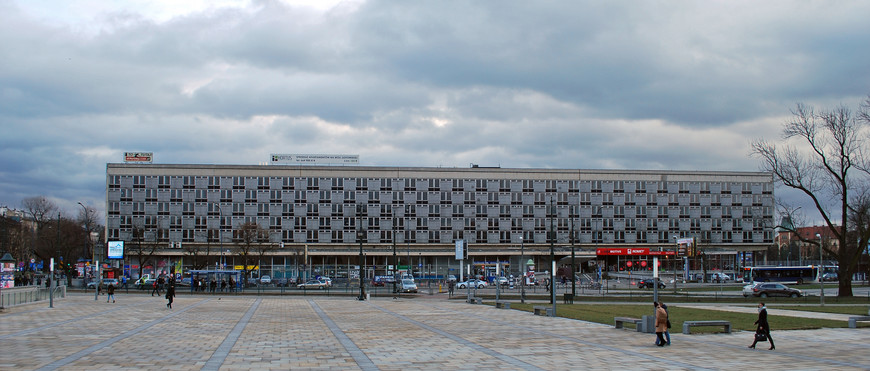This abandoned modernist 1960s hotel sitting right across from the National Museum might be an eyesore to many - especially when covered by a giant ad, as it is for the majority of time - but in its heyday it offered a whiff of Western luxury in drab communist reality. Indeed, though modernism is now inescapably tied to the Soviet era in Eastern European consciousness, at the time it was still a fairly new alternative to the socialist realism pursued after WWII (think Nowa Huta - monumental columns, arches and porticos). Cracovia architect Witold Cęckiewicz took inspiration from 1950s Paris, where he marvelled at new modernist housing estates popping up on the city’s peripheries. His project featured elements which were unheard of in Poland at the time, including a ‘curtain wall’ facade of glass and aluminium, nicely contrasting the closed-off exterior of the National Museum across the street.
At the time of construction - 1960-1965 - Cracovia was a wonder to behold by communist standards: 422 rooms all fitted with private bathrooms, telephones and radios, flashy decor courtesy of renowned avant-garde artists, a parking lot for 200 cars, a cafe with outdoor seating, a restaurant, pastry shop and services including an office of the state-owned tourism agency Orbis (who actually owned the hotel), a flower shop, bookstore, hairdresser and Cepelia souvenir shop. Among the many frivolities were the famous cream cakes served in the restaurant and cafe, apparently so good that prime minister Cyrankiewicz would send for them all the way from Warsaw. Then there was the next-door Kijów Cinema, a panoramic wonder fit for a new, wealthier era: after all, this was the time of a political and cultural thaw following eight years of Stalinism in Poland.
Of course, these were luxuries few could afford; and so, in communist Poland hotels were considered more than just mere accommodation. Geared towards foreigners and well-off communist party officials, they were enclaves of luxury otherwise unattainable in the People’s Republic, offering expensive meals, alcohol and a ‘worldly’ atmosphere, miles away from the reality of the common folk, who would struggle to afford a coffee at the hotel cafe. The locals they did attract were mostly those who had something to gain from the prominent guests, including illegal money changers, sex workers and, of course, the secret police. Communist-era hotels were perfect places for surveillance, gathering all travelling politicians and Western visitors (suspicious by definition) in one place, where they could be neatly spied on. Unfortunately for apparatchiks, funds were too tight to bug more than a few select rooms, so at check-in a government-appointed receptionist would decide whether a guest was ‘interesting’ enough to warrant a microphone by the bedside.
That era ended with the fall of communism, and eventually Cracovia founds itself unable to compete with new hotels offering 21st century standards, closing permanently in June 2011. The same year, it was purchased by the Echo Investment company, with plans to raze the building and build a shopping centre in its place. This move was met with biting criticism from fans of modernist architecture and nostalgic types opining that the building should be placed on the historic landmark register instead. Happily for them, Cracovia was finally purchased by the National Museum in 2016, with plans to turn it into the Museum of Architecture & Design. In the meantime, the Design Forum and Dydo Poster Gallery have found a place for themselves here, and the hotel is occasionally open to visitors for temporary exhibitions or events such as the Night of Museums.




Comments